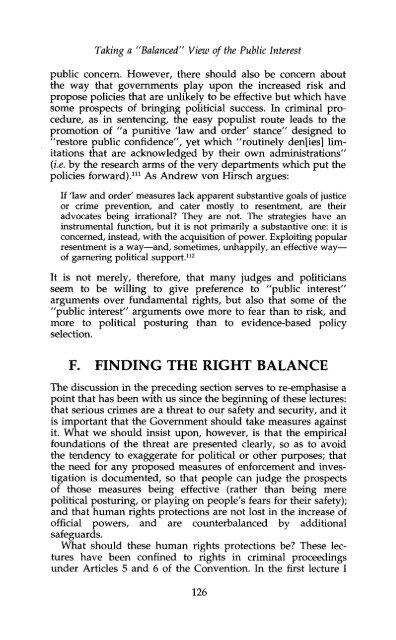Human Rights, Serious Crime and Criminal Procedure - College of ...
Human Rights, Serious Crime and Criminal Procedure - College of ...
Human Rights, Serious Crime and Criminal Procedure - College of ...
- No tags were found...
You also want an ePaper? Increase the reach of your titles
YUMPU automatically turns print PDFs into web optimized ePapers that Google loves.
Taking a "Balanced" View <strong>of</strong> the Public Interestpublic concern. However, there should also be concern aboutthe way that governments play upon the increased risk <strong>and</strong>propose policies that are unlikely to be effective but which havesome prospects <strong>of</strong> bringing politicial success. In criminal procedure,as in sentencing, the easy populist route leads to thepromotion <strong>of</strong> "a punitive 'law <strong>and</strong> order' stance" designed to"restore public confidence", yet which "routinely den[ies] limitationsthat are acknowledged by their own administrations"(i.e. by the research arms <strong>of</strong> the very departments which put thepolicies forward). 111 As Andrew von Hirsch argues:If 'law <strong>and</strong> order' measures lack apparent substantive goals <strong>of</strong> justiceor crime prevention, <strong>and</strong> cater mostly to resentment, are theiradvocates being irrational? They are not. The strategies have aninstrumental function, but it is not primarily a substantive one: it isconcerned, instead, with the acquisition <strong>of</strong> power. Exploiting popularresentment is a way—<strong>and</strong>, sometimes, unhappily, an effective way—<strong>of</strong> garnering political support. 112It is not merely, therefore, that many judges <strong>and</strong> politiciansseem to be willing to give preference to "public interest"arguments over fundamental rights, but also that some <strong>of</strong> the"public interest" arguments owe more to fear than to risk, <strong>and</strong>more to political posturing than to evidence-based policyselection.F. FINDING THE RIGHT BALANCEThe discussion in the preceding section serves to re-emphasise apoint that has been with us since the beginning <strong>of</strong> these lectures:that serious crimes are a threat to our safety <strong>and</strong> security, <strong>and</strong> itis important that the Government should take measures againstit. What we should insist upon, however, is that the empiricalfoundations <strong>of</strong> the threat are presented clearly, so as to avoidthe tendency to exaggerate for political or other purposes; thatthe need for any proposed measures <strong>of</strong> enforcement <strong>and</strong> investigationis documented, so that people can judge the prospects<strong>of</strong> those measures being effective (rather than being merepolitical posturing, or playing on people's fears for their safety);<strong>and</strong> that human rights protections are not lost in the increase <strong>of</strong><strong>of</strong>ficial powers, <strong>and</strong> are counterbalanced by additionalsafeguards.What should these human rights protections be? These lectureshave been confined to rights in criminal proceedingsunder Articles 5 <strong>and</strong> 6 <strong>of</strong> the Convention. In the first lecture I126
















